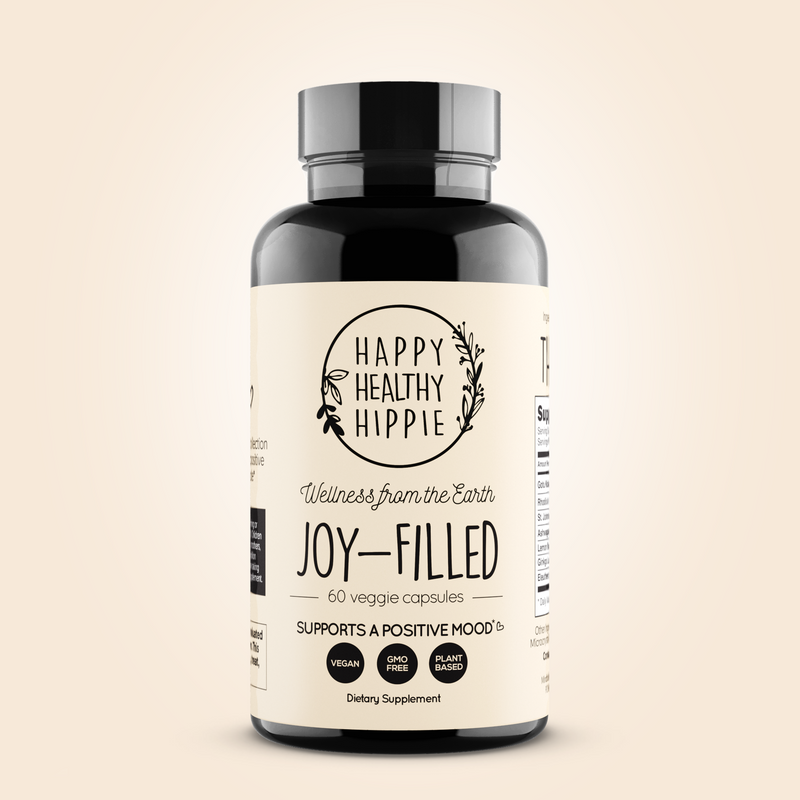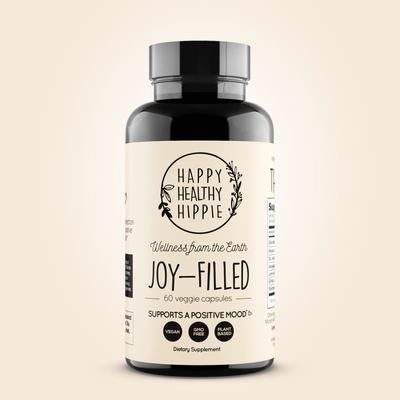
If you’re having trouble lifting your spirits lately, rest assured - it’s not just you. Statistically, 40 million Americans are experiencing some degree of anxiety and depression.
And does it really come as a surprise? Most of us lead energy-consuming lifestyles, barely making time for a breather or natural mood boosters like human contact, socialization and even outdoor activities.
Here is the good news: we can still control what we consume (be it food nutrients or supplements). And, luckily, mood boosting supplements are some of the best ways to enhance mental wellbeing.
Which brings us to this article!
Read on to discover 12 of the best all-natural mood booster supplements out there!
Let’s dive right in!
12+ Best Mood Booster Supplements
It’s scientifically established that what we eat doesn’t only affect our physical, but also our mental health and well-being.
That’s not surprising — think about the last time you felt crummy after binging on a bag of chips or that tub of ice cream. The first few bites were so good, but, once the initial euphoria passed, you ended up feeling so bad.
That’s because you just jammed a bunch of processed, artificial, and hormone-disruptive ingredients into your body.
Get this:
“Like an expensive car, your brain functions best when it gets only premium fuel. Eating high-quality foods that contain lots of vitamins, minerals, and antioxidants nourishes the brain and protects it from oxidative stress — the “waste” (free radicals) produced when the body uses oxygen, which can damage cells.
Unfortunately, just like an expensive car, your brain can be damaged if you ingest anything other than premium fuel. If substances from “low-premium” fuel (such as what you get from processed or refined foods) get to the brain, it has little ability to get rid of them. Multiple studies have found a correlation between a diet high in refined sugars and impaired brain function — and even a worsening of symptoms of mood disorders, such as depression.” — Eva Selhub, “Nutritional psychiatry: Your brain on food”, Harvard Health Publishing
So what are these alternatives to better mental health?
The 15 mood booster supplements you’ll read about here will help you offset the effects of “low premium” food sources that may be further hijacking your body and mind.
You’ll not only experience a better, more stabilized mood, you’ll also get deeper sleep, feel calmer, and remain more focused without stimulants.
#1. Joy-Filled

A collection of herbs is more effective in treating mood and mental health disorders instead of single supplements - which is why, Joy-Filled, a mood booster supplement, is so effective.
This 7-blend supplement features a collection of herbs that address:
- Anxiety
- Mood swings
- Overactive or racing thoughts
- Tension in the body
- Excessive stress
The Joy-Filled mood booster supplement herbs include Rhodiola Rosea, Ashwagandha, St. John’s Wort, lemon balm leaf, Gingko Biloba, Gotu Kola, and Eleuthero. These herbs increase the production of GABA, which is a neurotransmitter that calms the body.
Besides this primary function, Joy-Filled can help to:
- Increase your body’s serotonin levels naturally
- Boost dopamine levels in the brain
- Stabilize norepinephrine
All three of these combine to maintain a positive mood, better cycles of energy, and a calmer mind throughout the day.
#2. Ginkgo Biloba

Ginkgo biloba is a native Chinese plant used as an herbal remedy for a range of issues. From blood flow disorders to help with asthma, allergies, and even dementia, this hearty plant is incredibly useful when it comes to addressing specific problems.
Besides these health ailments, however, Ginkgo biloba can be used as a mood booster supplement. Studies have shown that long-term use of this plant’s extracts can boost dopamine levels.
This means you can use it to improve cognitive function, relieve stress, boost memory, and stabilize your mood.
#3. Magnesium

You may already know that magnesium is an essential mineral for your sleep cycle. It keeps your mind and body healthy, and you can consume quite a bit of it naturally through dark, leafy green veggies.
However, research also shows that using magnesium as a mood booster supplement can help naturally increase and then stabilize your dopamine levels, and keep your mood level throughout the day.
#4. Vitamin D

Vitamin D is known as the “sunshine vitamin” because we get it through sunlight. And, when you have a deficiency, it’s instantly noticeable.
Vitamin D deficiency can lead to fatigue, lowered immunity, skin disorders, and an increased likelihood of developing depression. So it’s incredibly important that you keep your vitamin D levels steady.
When you use vitamin D as a mood booster supplement, the effects are similarly impactful. It works together with Omega-3s (another mood booster supplement we’ll look at in detail) to optimize serotonin and dopamine levels, which then directly affects how good you feel.
Disclaimer: Before supplementing with Vitamin D, we'd recommend you consult your primary case physician to see if you actually have a deficiency.
#5. NAC (N-acetylcysteine)

N-acetylcysteine is a long-winded name for a molecule that’s used as a therapeutic agent in psychiatry treatments. We’re only now beginning to understand its role in maintaining mental health, but there’s a lot to be hopeful for.
It’s a precursor to the amino acids glutathione and L-cysteine. Now, what’s most interesting about this emerging “agent” is that it can modulate or change neural and inflammatory pathways in the body.
You can take this compound in doses of about 2 to 2.4 grams per day to help with the mood-altering effects of mental health issues like depression and anxiety.
#6. SAM-e (S-adenosylmethionine)

Another compound with an almost unpronounceable name has a proven track record as a mood booster supplement. That would be SAM-e (or S-adenosylmethionine), something that is already found naturally within your body. Taking this as a supplement simply helps keep your neurotransmitters in optimal balance and health.
Like vitamin D, SAM-e works to synthesize important neurotransmitters connected to your mood and energy, which means it’s crucial for dopamine, serotonin, and norepinephrine. Studies suggest that it can improve your mood, as well as increase the efficacy of any antidepressants you may be taking.
#7. Cordyceps

No mood booster supplement list is complete without including the undeniable benefits of adaptogenic mushrooms. There are quite a few to choose from, but when it comes to giving you better mental performance and more energy, Cordyceps has got you covered.
As a science-backed adaptogen, Cordyceps delivers multiple benefits to the body:
- It helps stabilize your blood sugar levels
- It enhances blood flow
- It can help the body utilize oxygen more efficiently
- It also helps to boost your libido
#8. Rhodiola Rosea

Rhodiola Rosea’s main function is to boost the body’s energy and stabilize the hypothalamic-pituitary-adrenocortical axis, also known as the HPA. That means it’s a great herb for adrenal fatigue because it affects the body’s stress response.
However, the HPA connection also directly affects your brain, which means that Rhodiola Rosea can modulate and stabilize the neurotransmitters dopamine and norepinephrine related to the body’s stress response.
If you’re over-stressed and are experiencing mood fluctuations because of chronic fatigue, Rhodiola Rosea is the ideal mood booster supplement for you.
#9. St. John’s Wort

St. John’s Wort is commonly used (and scientifically backed) as a mood booster supplement for those suffering from depression. In fact, a review of this herbal treatment found that consistent use of St. John’s Wort reduced mood and anxiety symptoms in people who had moderate depression.
However, St. John’s Wort comes with a label of caution.
You should consult your healthcare practitioner first before taking any amount of dosage as the herb has found to interact with some antidepressants. The side-effects of this interaction can lead to a potentially deadly condition called serotonin syndrome, causing nausea, heart palpitations, and vomiting.
Joy-Filled is a 100% plant-based supplement that supports you by:
- Relieving Daily Stress and Tension in the Mind and Body
- Soothing Anxiousness and Worries
- Uplifting Mood and Energy
- Healing Ingredients include Ashwagandha & Ginkgo Biloba
Try it risk free with our 60-Day Money Back Guarantee.
#10. Lion’s Mane

Also known as “Yamabushitake,” Lion’s Mane is another adaptogenic mushroom that has culinary and therapeutic uses. The extracts of this mushroom contain bioactive compounds that, as the name suggests, adapts to what your body needs, so it can naturally regulate itself over time.
From sharpening memory to protecting against dementia and Alzheimer’s, this mood booster supplement has significant positive effects on the body. Most importantly, emerging research shows that Lion’s Mane can help those experiencing depression and anxiety by reducing its effects, especially for menopausal women.
#11. Omega-3 Fatty Acids

In recent years, Omega-3 fatty acids have managed to break through and become the must-have supplement that “does it all.” Not only does a regular intake of Omega-3s improve heart health and preserve cognitive brain function, but it also boosts hair growth and skin health.
But what about its role as a mood booster supplement? As it turns out, Omega-3s neuroprotective properties make it a fantastic candidate for this therapeutic cause as well.
Even though more research is needed, what we do have is incredibly conclusive. In a 2020 study of 638 women, researchers found that Omega-3 fatty acids greatly improved depression and elevated moods in pregnant and postpartum women.
#12. Probiotics

You may be thinking, “Probiotics? You mean those bacteria in yogurt?”
Yes, probiotics do exist as a bacteria culture in yogurt. But that’s not why they’re so important as a mood booster supplement.
Probiotics deeply influence your gut, which, in turn, affects all aspects of your nervous system. We call this the gut-brain connection, and emerging research shows that there’s a lot that probiotics can do to improve your intestinal microbiome.
Right now, about 95% of your body’s serotonin, the key hormone that stabilizes your mood, is produced in your gastrointestinal tract. In other words, the digestive system doesn’t just help you digest, it also creates those moods and emotions you experience.
Probiotics are the “good” bacteria that protect your intestinal lining and create a barrier against toxins and the “bad” bacteria that can cause inflammation. They also activate the neural pathways that connect the gut, the brain, and the hormones that travel in between.
4+ Other Natural Ways to Improve Your Mood
Mood booster supplements are just one way to improve your mood and safeguard your mental health.
There are quite a few other strategies you can use that are natural mood boosters and will help you improve all aspects of your health and life. Let’s take a look at just four impactful changes you can make right now.
#1. Start With a Social Media Detox
Social media can help us do a lot of good things. It can help us connect with others, inspire us, amuse us, and motivate us.
However, the “dark” side of social media is comparison, envy, a constant seeking for validation and approval, and being sold things we don’t actually need because we feel inadequate.
In fact, research on social media and neurotransmitters conducted by Harvard shows that prolonged and consistent social media use distracts and breaks up your focus and attention.
Consuming social media gives you hits of dopamine, much in the way that recreational drugs do. Over time, social media delivers less and less enjoyment as your brain adapts.
We not only become reliant on social media to feel euphoric or engaged again, we actually end up feeling more anxious and depressed as we compare our lives to the highly curated images of others.
To break the cycle and reset the mind-body connection, plan a “detox” from social media. You don’t need to delete any accounts — simply delete the apps off your phone. You can also turn off notifications and commit to a period of one to two weeks.
Some people who perform a social media detox choose to journal about their moods and feelings each day so they can track the changes and see whether this strategy makes a positive difference in their lives.
#2. Sleep It Up!
The best way to reset your mood is to take a nap. Even a short, 15 to 20-minute nap can leave you feeling refreshed and more balanced. Not only does more sleep in your life do wonders for your body, but it can also help your mind de-stress and get back to what you need to do in a more focused manner.
It will ironically take less time to do things than if you had continued to force yourself to perform while tired.
If you’re wondering why sleep works so well to boost your mood, science shows there’s a clear “bidirectional” link between emotions (and thoughts) and the duration and quality of sleep we get.
Here are some of the ways in which sleep helps keep our mood stable:
- Sleep acts as a protective mechanism for the mind — with more sleep, our emotions are more resilient when faced with “stressful” situations
- Sleep modulates our responses — such as the “startle” response. You’re less likely to be easily alarmed and more able to respond with calmness and focus
- Over time, a consistently stable mood allows us to sleep deeper and get more restful sleep
Sometimes, it can be hard to break the cycle of poor sleep and dips in your mood. A good place to start to get your body back on its natural (and optimal) sleep cycle is using a supplement like Namastay in Bed. This collection of herbs, along with melatonin, helps you feel more relaxed and sleepy at night, without any drowsiness the next morning.
#3. Invest in Self-Care
Picture this:
A stressed-out or anxious mood leaves you awake at night, tossing and turning, as the same thoughts run through your mind over and over again.
Essentially, what’s happening here is that you can’t seem to give yourself permission to fall asleep. And permission is what it comes down to when you’re investing in any form of self-care.
Allowing yourself to get the full eight hours of sleep that your body is calling for, rather than whipping out of bed just because you think you should, is just one way you can practice self-care.
Because self-care is so personal, it can be hard to define. But that’s why “permission” is a great way to look at it. Are there things in your life that promote relaxation and a feeling of well-being that you’d love to do but that you convince yourself that you can’t?
Doing them anyway is what self-care is all about.
For some people, that can be giving themselves the permission to step away from working in the evening and taking a bath before heading to bed instead.
For others, self-care means giving themselves the permission to take a mid-day walk or jog without worrying about their little kids at home who need their attention.
You’ll know you’re practicing self-care when you start to feel better about yourself, for longer periods of time. Once you commit to doing one thing that feels good, it gets easier to say “yes!” to other good-for-you commitments. Pretty soon, your mood will get up and stay up.
#4. Use Uplifting Scents
Speaking of keeping your mood up, nothing does this quite as well (or as instantly) as feedback from our senses.
Think about biting into a particularly delicious, gooey slice of chocolate cake. Or recall how listening to your favorite song that suddenly comes on the radio makes you feel. It instantly amplifies your mood, right?
The same is true for scents. Aromatherapy, or the use of scents for therapeutic purposes, relies on natural scents from herbs, spices, and flowers to infuse calm, energize us, make us feel more relaxed, and generally put us in a more pleasant mood.
In fact, there are essential oils for hormonal balance, adrenal fatigue, insomnia, and so on.
Pick a few complementary scents and apply them with a carrier oil such as jojoba to your temples, wrists, and the base of your ear lobes. You can also diffuse these scents in a room for a relaxing, overall experience.
Conclusion
A final word of advice before you hop off to try these mood booster supplements for yourself:
Don’t mistake a series of “bad” days for a “bad” life. Think about your mood like a set of colored glasses or an overlay. They can influence your perception of what’s going on, but perception isn’t necessarily reality.
In other words, when you’re feeling low, irritated, anxious, or depressed, you need to find tangible ways — such as the strategies and mood booster supplements above -- to smooth out your perception. Remember that no one is “up” 100% of the time and it’s okay to not feel okay.
Your life can still be meaningful, purposeful, and full of joy — even if your current mood says something different.


